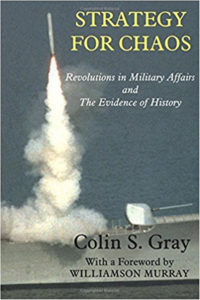
Strategy for Chaos: Revolutions in Military Affairs and the Evidence of History
Colin Gray
Routledge (2004)
Rs3,225
In this volume, Professor Colin Gray develops and applies the theory and scholarship on the allegedly historical practice of the ‘Revolution in Military Affairs’ (RMA), in order to improve our comprehension of how and why strategy ‘works’.
The author explores the RMA hypothesis both theoretically and historically. The book argues that the conduct of an RMA has to be examined as a form of strategic behaviour, which means that, of necessity, it must “work” as strategy works. The great RMA debate of the 1990s is reviewed empathetically, though sceptically, by the author, with every major school of thought allowed its day in court.
The author presents three historical RMAs as case studies for his argument: those arguably revealed in the wars of the French Revolution and Napoleon; in World War I; and in the nuclear age. The focus of his analysis is how these grand RMAs functioned strategically. The conclusions that he draws from these empirical exercises are then applied to help us understand what, indeed, is - and what is not - happening with the much vaunted information-technology-led RMA of today.
Prof Gray is the Director of the Centre for Strategic Studies within the Department of Politics and International Relations. He has spoken at the Character of War project at Oxford, he is a very long-time member of the International Institute for Strategic studies and the Royal United Services Institute. Also, he is an active member of an important strategic “think tank” in Washington, DC, the National Institute for Public Policy, which he founded in 1981. The United States is his principal country of interest and expertise.
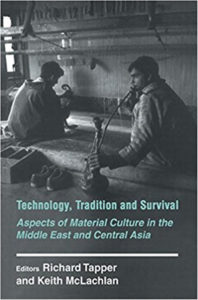
Technology, Tradition and Survival: Aspects of Material Culture in the Middle East and Central Asia (History and Society in the Islamic World)
Richard Tapper &? Keith McLachlan
Routledge (2002)
Rs2,972
The contributors address the history, originality, variety and sophistication of traditional science, technology and material culture in the Middle East and Central Asia, their influence on the history of Europe and the West, and the threat posed by modern Western technologies.
Contemporary events in the Islamic world dominate the headlines and emphasise the crises of the Middle East and North Africa, yet the Islamic World is far larger and more varied than we realise. Current affairs there too mask the underlying trends and values that have, over time, created a fascinating and complex world. This new series is intended to reveal that other Islamic reality by looking at its history and society over the ages, as well as at the contemporary scene. It will also reach far further afield, bringing in Central Asia and the Far East as part of a cultural space sharing common values and beliefs but manifesting a vast diversity of experience and social order.
Richard Tapper is Lecturer, Reader and Professor in SOAS 1967-2004; fieldwork in Iran, Afghanistan, Turkey; published on pastoral nomadism, ethnic and tribal minorities and the state, material culture, culinary culture, anthropology of Islam, Iranian Cinema.
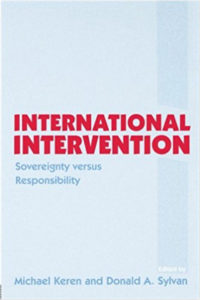
International Intervention: Sovereignty Versus Responsibility
Michael Keren,? Donald A. Sylvan
Routledge (2002)
Rs2,972
National sovereignty, defined as a nation’s right to exercise its own law and practise over its territory, is a cherished norm in the modern era, and yet it raises great legal, political and ethical dilemmas. This study looks at the problems created by international intervention.
The idea that states, as self-governing territorial entities, are formal equals by nature, and that they cannot be equals unless they are substantially independent in practice, dates from the 18th Century. The title of this modest symposium recalls Emmerich de Vattel’s suggestive pairing of duties. Vattel state with striking clarity in 1758 that sovereign equality implies a duty not to intervene in the affairs of other states. But it does not affect the duty that we all have as human beings to help each other in time of need.
Michael Keren, born in Jerusalem, received his B.A. in philosophy and political science at the Hebrew University in Jerusalem in 1968 and his Ph.D. in political science at the University of Minnesota in 1975. Since 1975 he lectured on political philosophy and political communication at Tel-Aviv University where he also served as department chair and as head of the Institute for the Study of Jewish Press and Communications. In 2002 he was awarded a Canada Research Chair in Communication, Culture and Civil Society at the University of Calgary. Professor Keren lectured in many universities and other institutions in North America, Europe and Asia, and frequently comments on Israeli and global affairs in the media.
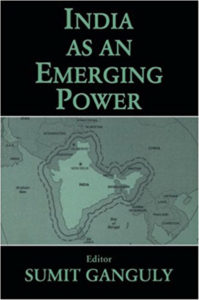
India as an Emerging Power
Sumit Ganguly
Routledge (2003)
Rs3,905
These essays examine India’s relations with key powers including the Russian Federation, China and the USA and with key adversaries in the global arena in the aftermath of the Cold War. One positive relationship is that of India’s relations with Israel since 1992.
This symposium volume by mainly American authors analyzes India’s successes and failures in trying to become a bigger player in international politics. Robert Hathaway recounts how Washington’s efforts to thaw relations with New Delhi have run into difficulties because of divergence over nuclear proliferation, China, India’s economic liberalization, and tensions with Pakistan. Stephen Cohen takes on the troublesome but persistent Kashmir problem.
John Garver explores the asymmetrical perceptions of threat that plague India-China relations. It becomes clear that India is still paying for its costly commitment to the losing side in the Cold War. The war on terrorism since September 11, 2001, has helped give India a slightly stronger voice internationally. But years of naive belief in their own rhetoric about being the leader of a significant Nonaligned Movement has left Indian leaders unsure of how to present themselves internationally or even as a regional power in South Asia. The rise of a mindless form of Hindu nationalism further muddies the waters. Although most of the authors are cautiously optimistic, this useful set of essays illuminates the obstacles that get in the way of India’s playing a larger international role.
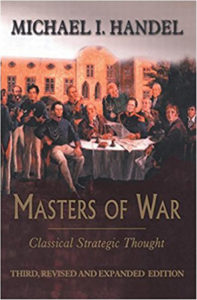
Masters of War: Classical Strategic Thought
Michael I. Handel
Routledge (2000)
Rs11,041
This is the first comprehensive study based on a detailed textual analysis of the classical works on war by Clausewitz, Sun Tzu, Mao Tse-tung, and to a lesser extent, Jomini and Machiavelli. Brushing stereotypes aside, the author takes a fresh look at what these strategic thinkers actually said?not what they are widely believed to have said. He finds that despite their apparent differences in terms of time, place, cultural background, and level of material/technological development, all had much more in common than previously supposed. In fact, the central conclusion of this book is that the logic of waging war and of strategic thinking is as universal and timeless as human nature itself.
This third, revised and expanded edition includes five new chapters and some new charts and diagrams.
This revised edition of a work by a prolific student of strategy at the U.S. Naval War College is pugnacious but compelling. Handel makes a number of important arguments, most of which center on his contention that the nineteenth-century Prussian theorist Carl von Clausewitz agreed with his Chinese counterpart Sun Tzu, who wrote two millennia earlier on the fundamentals of war. The prose is not always easy, and some readers may find the tables and diagrams unpersuasive, but this book offers a powerful, sustained argument that strategic thought has not advanced “beyond the pre-NeWTOnian stage of development.” A sprawling, tough-minded, and provocative work.
Dr. Michael Handel was a Professor of Naval Strategy at the U.S. Naval War College from 1990 to his death in 2001. He was an expert on strategic theory, nature and operations of war, and the future of warfare. He held a Ph.D in Government from Harvard University. For seven years (1983-1990) he was Professor of National Security Affairs at the U.S. Army War College. He was a member of the Olin Institute for Strategic Studies at the Center for International Affairs at Harvard, founder and U.S. editor of the journal Intelligence and National Security, and author of numerous books on theory and practice of war including Masters of War: Sun Tzu, Clausewitz and Jomini (1992); Intelligence and Military Operations (1990); and War, Strategy, and Intelligence (1989). He was an authority on the problem of strategic surprise, and on the methodology and theoretical aspects of intelligence. His interests included the future of naval warfare and the role of navies in intervention. At the time of his death, he was working on a book on multi-front warfare, and on studies of comparative strategic theory.

